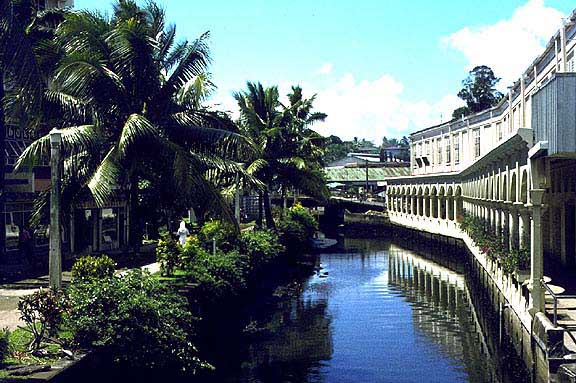
Fiji III RPCV Phil Campbell worked as extension agent, now is County Judge
In a land far away
by Kay F. Louth
May 23, 2003 - What does a greeting from the Fiji islands in the South Pacific have to do with a Van Wert County farm boy? In 1969, Phil Campbell was feeling frustrated with college and its lack of connection to real life. It was a time of questioning values for what matters, what was right, or what would benefit the community. Leaving school to do something positive seemed to be an option.
Campbell, current Van Wert County Municipal Court Judge, had already taken his exam for entrance into law school. "I originally expected to go to law school in the fall, but I went to the Peace Corps instead."
He ended up in the South Pacific on Fiji working with dairy and hog farmers on the island nation. Fiji is composed of about 330 islands, including reefs and tiny islets. About 100 of these islands are inhabited. It's land mass is roughly 11,000 square miles.
The move to Fiji proved to be a great culture shock for Campbell. Walking was the primary mode of transportation and Campbell learned to travel light, living in gumboots and shorts, shirts and a hat. There was no electricity, no refrigeration and meals were prepared on a kerosene cooker and most often consisted of rice and dahl, a split pea soup and sometimes curry.
Water for bathing and drinking came from rainwater collected in a barrel. Showers were taken with sun-heated water pumped up to a roof barrel and the bathroom facility was a pit latrine. The only roads were gravel and the few vehicles around were mostly government vehicles.
Campbell was a part of Fiji III, the third Peace Corps (Falla Ni in Fijian) group. Born and raised in Convoy, Campbell came from a background in dairy and pig farming. He characterized his job in Fiji as that of an extension agent with the focus being on dairy and pig farmers with the ultimate goal of increasing protein consumption among the population. "As protein consumption increases, the population gets healthier," Campbell said. The Peace Crops first wanted to increase milk production with the milk by-products used to increase meat production on the pig farms.
Campbell introduced the farmers to some simple techniques to increase the health, production and herd size. First, he introduced the concept of identifying cows, the ones which were sick, the ones weighing the most, ones birthing calves regularly and the ones that gave the most milk. This was done so farmers could cull out the least productive cows and keep those that would increase herd size and thereby increase milk production. Campbell said that farmers were able to increase milk production by 30 percent.
Campbell credits the Peace Corps success and his success to that the fact that the Peace Corps volunteers were "hands on," actually out in the fields with the people getting their hands dirty. The British, he said, would send someone in once every two years and they would criticize the way the things were done and then disappear. "We were trained to speak their language and to respect their culture and effort," Campbell said. "Part of what you learn was to accept accomplishments as defined by the country you're in. The values of a Peace Corps volunteer came in a very fundamental level."
One of the best parts of his Fiji experience, he said, was the monthly trip to the capital, Suva. He could eat in a real restaurant where he could get something the Fijians called steak. "It was a long way from filet, but it was an actual meal with silverware," Campbell said. For the 47-mile trip to Suva he would ride a bus for three hours over mountainous gravel roads, spend the weekend and then make the three-hour return trip to his village.
Eventually Campbell trained his replacement but he was asked to stay on with the Peace Corps for a third year and continue his work. Coming back to America was as much a counter culture shock for Campbell as his sojourn in Fiji.
In Fiji, he lived in a two-room, (cooking room outside) bamboo hut and he used lanterns for lighting. On his return to America he noted, "When I first came into a darkened room, my first thought was not where was the light switch, but where is my lantern?" By contrast, Campbell said, when his parents came to visit him in Fiji, the first thing his father did when he came into his house was to reach for a light switch. Even getting a drink of water was an unfamiliar task.
In Fiji, he had to go outside to the rain barrel to get a glass of water. "Certain things you totally forgot, fast food, the idea of French fries, potato chips in a bag, it was mind boggling the way everyone just jumped in a car to go somewhere."
When he returned to America, Campbell finished his senior year at Bowling Green and then went on to law school before becoming the community's judge.
